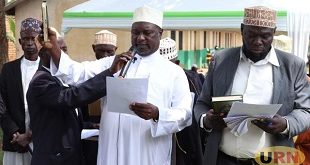
By Julius Odeke
After a series of calls from various sections of people in the country, especially religious, political and local leaders from the Lord’s Resistance Army (LRA) affected Northern region especially the Acholi sub region; an amnesty law was enacted in 2000.
A statement by ambassador James Baba minister of State for Internal Affairs on amnesty in Uganda says, “Amnesty was extended to all Ugandans who were involved in insurgency through: actual participation in combat, collaborating with insurgents, committing other crimes to support insurgency, or in any other way assisting others involved in insurgency.
Babda says, “The Act has been amended twice.” Adding that an amnesty/pardon/forgiveness was then declared for all Ugandans engaged in acts of war or armed rebellion against the Government of Uganda since January 1986.
“The sole objective was to end hostilities in the affected areas,” he added. The law also established an Amnesty Commission with the mandate to resettle, demobilize, reinsert and reconcile the parties.
It is therefore estimated that 26,300 ex combatants have received amnesty to date and 5,335 are being reintegrated into their communities.
As the country consolidates the peace it has attained over the years, the continued relevance of peace efforts like the amnesty law are put into question against the quest for justice and accountability for victims of gross atrocities.
The amnesty situation in Uganda is a complex one in that International law has over the year’s outlawed amnesty to individuals suspected of committing gross international crimes.
In the Ugandan situation, this issue is not resolved. The concept of amnesty amidst the pursuit of other justice mechanisms for victims presents a vivid conflict of not only laws but justice options.
Process engaged at arriving at the current law
The decision to lapse Part II of the Amnesty Act accrued from a legitimate process as required by the Amnesty Act. It was informed by a Justice Law and Order Sector review of the Amnesty law which revealed that the grant of unconditional amnesty was generally seen as problematic since it did not take into account the need for accountability for serious crimes committed during armed conflict or rebellion.
Baba says the process was also guided by the Agreement on Accountability and Reconciliation (an annexure to the Final Peace Agreement between the Government of Uganda and the Lord’s Resistance Army/Movement, Juba, 2007); whose principles are embedded in the need for accountability, reconciliation, victim’s rights, and reparations among others.
In so far as the Agreement calls for accountability of serious crimes and human rights violations committed during the conflict in Northern Uganda, the Amnesty Act presents a conflict with this obligation by barring such investigation, prosecution and punishment of serious crimes.
The Agreement therefore obliges the Government of Uganda to adopt an appropriate Policy framework for the implementation of the terms of the agreement as well as introduce any amendments to the Amnesty Act to bring it in conformity with the principles of the Agreement.
 The Independent Uganda: You get the Truth we Pay the Price
The Independent Uganda: You get the Truth we Pay the Price



